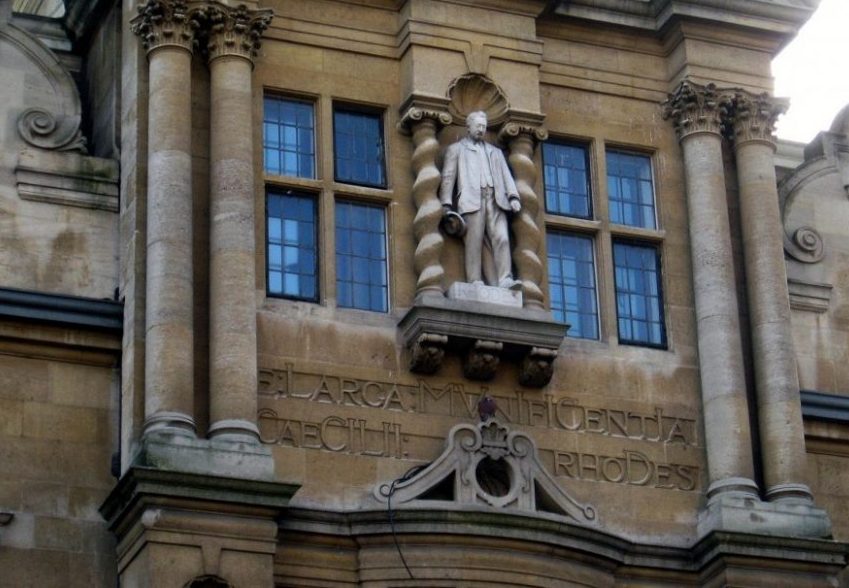
[This is an extract from an article published in 2016 in The Round Table: The International Journal of Commonwealth Affairs. Opinions expressed in articles do not reflect the editorial position of the Round Table.]
That the ‘Rhodes must fall’ campaign spread relatively quickly from the slopes of Table Mountain to Oxford’s High Street should occasion little surprise in the age of global media, and given the extent of Rhodes’ legacy in Oxford—the Rhodes Chair of Race Relations, Rhodes House, home, until recently, to the Bodleian’s Commonwealth library as well as a centre for Rhodes scholars from across the Commonwealth and the USA, and since 2004 the Mandela Rhodes Foundation, not to mention the presence of a very active African Studies Centre in the University. Rhodes’ benefaction to his old college, Oriel, is—or was until recently—less well known. Ironically, the statue at the centre of the controversy stands too high to be noticed by most who walk beneath it.
The reactions of the University of Cape Town (UCT) and Oriel College to demands from student protest movements reflect the environments in which the two institutions operate. In South Africa race is central in public and political discourse, with the ‘rainbow nation’ of Tutu and Mandela now seldom mentioned and the African National Congress clearly bent on using racism as its main tool in limiting the advance of the Democratic Alliance opposition. To be labelled racist has frightening consequences for both individuals and institutions, and the latter are understandably anxious to avoid it: hence the rapid and near unanimous decision of UCT’s council to remove the statue in the face of violent protest and disruption of its normal functions. Oriel’s governing body reacted more cautiously: a six-month ‘consultation period’, willingness to explain historical context and positive moves including lecture and seminar series on issues of ethnicity, race and colonialism (something hardly lacking in Oxford already). But the reactions of both institutions reflect fear of the potential for huge damage to their image and reputation, fear of ongoing vilification with uncertain outcomes and, at UCT, fear of the reactions of a government likely to use the protest for its own political advantage. Both institutions suffered a backlash from old students and actual or potential donors, decisively so in Oriel’s case, where the financial consequences appear to have been dramatic and have led to the curtailment of the consultation period and an announcement that Rhodes will not fall. Inevitably, if unfairly, Oriel will be criticised both for the pusillanimity of its initial reaction and for letting financial considerations triumph.
Few have sought to defend Rhodes’ views—indeed there has been little attempt even among the majority who wish his statue to remain to defend him and assess his achievement, other than stating that he must, like all major figures from the past, be assessed in terms of the values of his day. Nelson Mandela himself would clearly have taken this view, and his willingness to link his name with Rhodes in the Mandela–Rhodes Foundation speaks for itself. This foundation has awarded 50 scholarships to students from Africa to study at Oxford in 2016, only eight of them to whites. Even the ‘racist’ label applied to Rhodes needs qualification, given that his will specifically states that Oxford’s Rhodes scholarships were to be awarded without reference to race.
The wider issue raised by the campaign is how we live with our history. The Rhodes controversy is by no means exceptional. It is part of a wider demand to ‘decolonise knowledge production’, linked to concepts of ‘safe space’ which seek to ban certain speakers from university campuses and free them of all that might offend. Princeton students wished to remove Woodrow Wilson’s name from campus buildings because of its allegedly racist connotations and students at the College of William and Mary want to remove a statue of Thomas Jefferson (a slave owner who also opposed colonial rule and accepted the equality of all men when he signed the Declaration of Independence in 1776). University of Oregon students have even debated removing a quotation from Martin Luther King’s ‘I have a dream’ speech on the grounds that it was insufficiently inclusive for current sensibilities. There are endless possibilities—what about Gladstone, whose first parliamentary speech included a defence of his family’s plantation interest? But Stephen Hawking reminds us, in this year’s Reith Lectures, that ‘It’s the past that tells us who we are. Without it, we lose our identity’. History, as Oxford’s Chancellor, Lord Patten, has said, ‘is not a blank page on which we can write our own version of what it should have been according to our contemporary views and prejudices’. A healthy culture does not cease to remember those with whom it has come to disagree. Rather, with the help of historians, it endlessly debates and revises its assessment of them.
Dr Anthony Lemon is an Emeritus Fellow, Mansfield College, Oxford.
Related articles:
Oxford college backs removal of Cecil Rhodes statue – The Guardian
Oxford protests ‘will continue’ until Cecil Rhodes statue falls – The Times
2016 – The ‘Rhodes Must Fall’ Campaign: Where would the Destruction End?
2007 – Towards the new South Africa – Anthony Lemon



